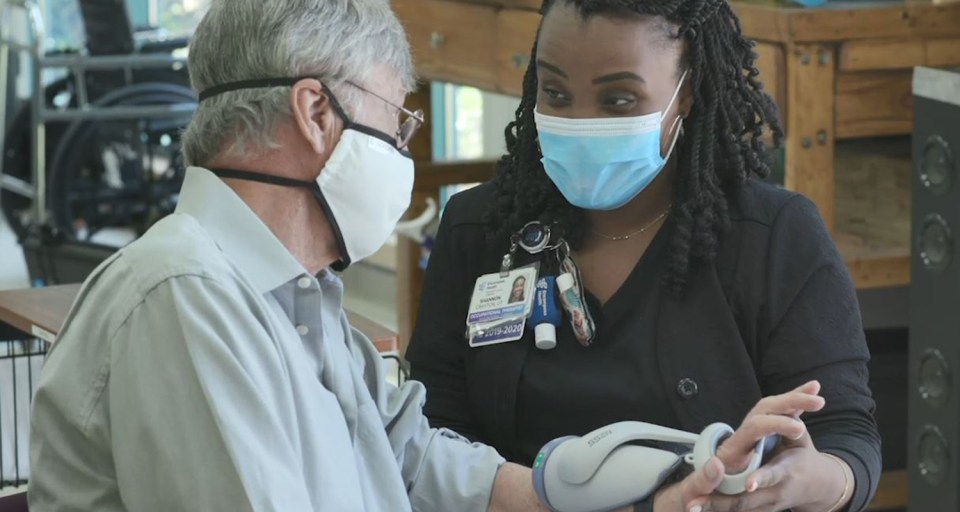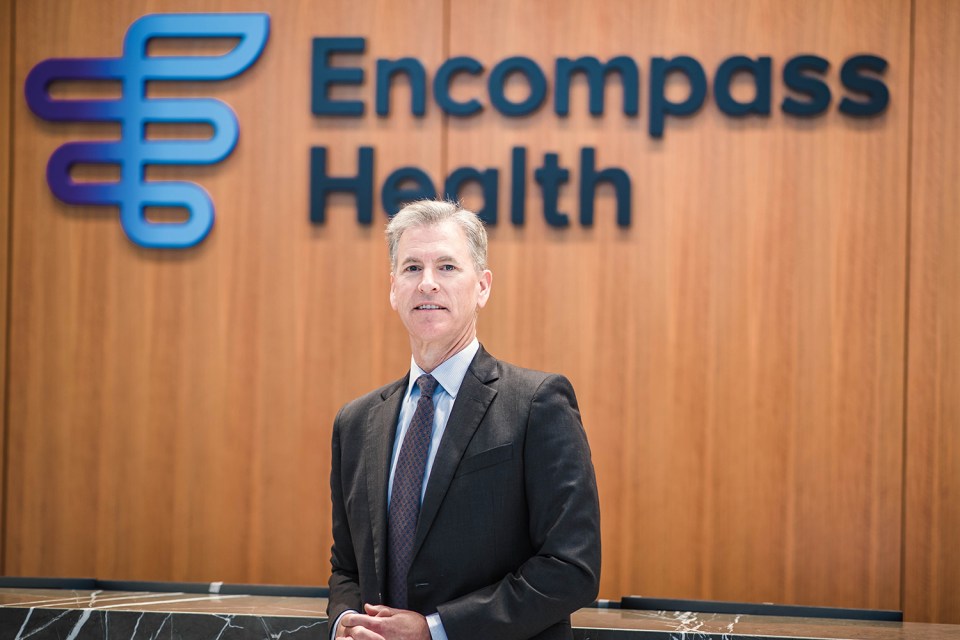Encompass Health finished 2019 strong, making continued progress toward its strategic initiatives, Mark Tarr, the Company’s president and CEO, told attendees at the 38th Annual J.P. Morgan Healthcare Conference.
The J.P. Morgan conference, held Jan. 13-16 in San Francisco, is the largest investment symposium in healthcare drawing more than 9,000 attendees.
During his Jan. 14 presentation, Tarr recognized Encompass Health as a national leader in integrated care, with 133 inpatient rehabilitation hospitals, 245 home health locations and 83 hospice locations. The Company’s national footprint includes 37 states and Puerto Rico.
Encompass Health is the largest owner and operator of inpatient rehabilitation hospitals, with 31 percent of all Medicare beneficiaries receiving inpatient rehabilitation care doing so in an Encompass Health hospital. It is also the fourth largest provider of Medicare-certified skilled home health services and a top 11 provider of hospice services.
After looking back at the successes of 2019, Tarr outlined the Company’s priorities moving forward in 2020. Below are some of the key takeaways from the Company’s participation at the conference:
- Encompass Health is well positioned to adapt to regulatory changes impacting both its business segments. Inpatient rehabilitation hospitals switched from the FIM tool to the IRF-PAI Section GG functional measurement tool Oct. 1, 2019, and home health’s new Patient Driven Groupings Model (PDGM) went into effect Jan. 1. Both of these changed the way the Company’s business segments receive Medicare reimbursements. However, Tarr said preparations for these changes began over a year ago at Encompass Health, and the Company is well positioned to adjust to them.
“If you think about our track record when there’s been regulatory changes, we’ve been able to mitigate the negative impacts of those changes,” he said. “We’ve come out on the other side really strong when other providers in the industry continued to struggle.” - The demand for Encompass Health’s services will continue for years to come. The need for the services Encompass Health provides will only increase in the years to come, with demographics driving that increase in all the Company’s business lines, Tarr said. To meet that increased demand, Encompass Health has four new inpatient rehabilitation hospitals targeted to open in 2020, and plans on adding an additional 100 to 120 beds to existing hospitals. The repeal of Florida’s CON laws also opens up opportunities for the Company to expand its footprint in the state. In its home health and hospice segment, the Company plans on investing an estimated $50 to $100 million in acquisitions, Tarr said, adding that the potential market disruption caused by the implementation of PDGM might present some appealing opportunities for Encompass Health.
- The Company will continue to improve the patient experience and outcomes through integrated care. Increasing clinical collaboration at Encompass Health continues to be a focus for the Company. The goal of clinical collaboration, Tarr said, is to improve patient satisfaction and outcomes while reducing the total cost of care across the healthcare continuum. In the Company’s overlap markets—where there is an Encompass Health inpatient rehabilitation hospital within an approximate 30-mile radius of an Encompass Health home health location, this has shown to true. Tarr said, in general, overlap markets are experiencing higher discharges to the home and fewer discharges to skilled nursing facilities.
- Encompass Health will remain focused on meeting the needs of those recovering from stroke. The Company’s strategic sponsorship with the American Heart Association/American Stroke Association’s Together to End Stroke initiative will continue in 2020, focusing on educating patients, caregivers, providers and payors on the value of inpatient rehabilitation for stroke patients. Encompass Health’s three-year stroke compound annual growth rate (CAGR) is approximately 6 percent. Tarr said there’s room to grow that even more, with others, such as the American Stroke Association, Veterans’ Administration and JAMA, concluding that an inpatient rehabilitation setting is better for stroke patients than a skilled nursing facility. With 123 of Encompass Health’s inpatient rehabilitation hospitals holding stroke-specific certification from The Joint Commission—representing roughly 60 percent of all TJC’s stroke-specific certifications—Tarr believes Encompass Health hospitals are well equipped to serve these patients and grow the Company’s stroke market share.
- The Company will develop more post-acute solutions in 2020, with a continued focus on improving patient outcomes and lowering the cost of care across the entire episode of care. The early on investment the Company made in an electronic health record (EHR) is paying off. Encompass Health is now using data from its EHR to create clinical tools to improve patient care and outcomes. In 2017, Encompass Health rolled out its ReACT predictive algorithm, which predicts the risk of an acute care transfer while at an Encompass Health rehabilitation hospital. This year, Encompass Health will roll out a readmission risk model complete with a readmission reduction playbook that will follow patients identified as high risk for a readmission after they leave an Encompass Health hospital. The Company’s ability to reduce readmissions is a significant part of its value proposition, Tarr said, as it lowers the risk of readmission penalties to acute hospital providers and lowers the total cost of care for all payors. The Company will also deploy Medalogix’s predictive analytics in all its home health locations to optimize patient care plans and reduce emergency room visits and hospital readmissions.
“All this data is helping us put tools in place to benefit patients, payors and providers,” Tarr said. “We think long-term, this is creating an even greater competitive advantage for us.”
Listen to Tarr’s full presentation at the 38th Annual J.P. Morgan Healthcare Conference and view his presentation here.
Forward-Looking Statements
Statements contained in this blog post which are not historical facts, such as those relating to demographic shifts and the industry shift to value-based care, the results of our sponsorship of Together to End Stroke, regulatory changes, and our growth plans, are forward-looking statements. In addition, Encompass Health, through its senior management, may from time to time make forward-looking public statements concerning the matters described herein. All such estimates, projections, and forward-looking information speak only as of the date hereof, and Encompass Health undertakes no duty to publicly update or revise such forward-looking information, whether as a result of new information, future events, or otherwise. Such forward-looking statements are necessarily estimates based upon current information, involve a number of risks and uncertainties, and relate to, among other things, future events, its business strategy, its projected business results or model, its acquisition opportunities, and the impact of future legislation or regulation. Actual events or results may differ materially from those anticipated in these forward-looking statements as a result of a variety of factors. While it is impossible to identify all such factors, factors which could cause actual events or results to differ materially from those estimated by Encompass Health include, but are not limited to, the any adverse outcome of various lawsuits, claims, and legal or regulatory proceedings involving Encompass Health, including any matters related to yet undiscovered issues, if any, in acquired operations; Encompass Health’s ability to attract and retain key management personnel; potential disruptions, breaches, or other incidents affecting the proper operation, availability, or security of Encompass Health’s or its vendors’ information systems, including unauthorized access to or theft of patient, business associate, or other sensitive information or inability to provide patient care because of system unavailability as well as unforeseen issues, if any, related to integration of acquired systems; the ability to successfully integrate acquired operations, including realization of anticipated tax benefits, revenues, and cost savings, minimizing the negative impact on margins arising from the changes in staffing and other operating practices, and avoidance of unforeseen exposure to liabilities; Encompass Health’s ability to successfully complete and integrate de novo developments, acquisitions, investments, and joint ventures consistent with its growth strategy; increases in Medicare audit activity, including increased use of sampling and extrapolation, resulting in additional unpaid reimbursement claims and an increase in the backlog of appealed claims denials; changes, delays in (including in connection with resolution of Medicare payment reviews or appeals), or suspension of reimbursement for Encompass Health’s services by governmental or private payors; changes in the regulation of the healthcare industry at either or both of the federal and state levels, including as part of national healthcare reform and deficit reduction (such as the patient driven groupings model and other payment system reforms); competitive pressures in the healthcare industry and Encompass Health’s response thereto, including any resulting from the repeal of CON laws; Encompass Health’s ability to obtain and retain favorable arrangements with third-party payors; Encompass Health’s ability to adapt to changes in the healthcare delivery system, including value-based purchasing and involvement in coordinated care initiatives or programs that may arise with its referral sources; Encompass Health’s ability to attract and retain nurses, therapists, and other healthcare professionals in a highly competitive environment with often severe staffing shortages; and other factors which may be identified from time to time in Encompass Health’s SEC filings and other public announcements, including Encompass Health’s Form 10-K for the year ended December 31, 2018 and Form 10-Q for the quarters ended March 31, 2019, June 30, 2019, and September 30, 2019.
The content of this site is for informational purposes only and should not be taken as professional medical advice. Always seek the advice of your physician or other qualified healthcare provider with any questions you may have regarding any medical conditions or treatments.



